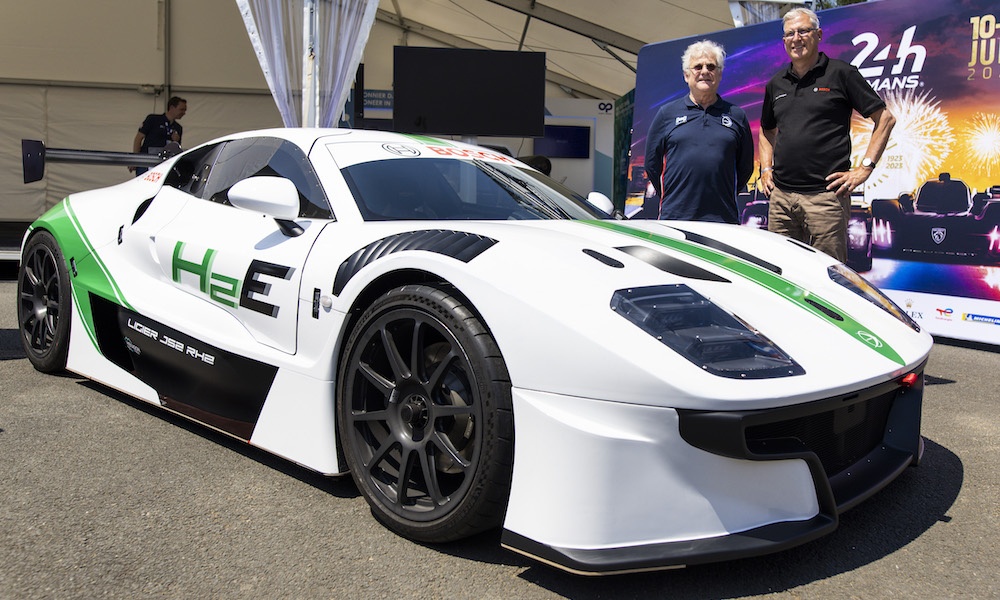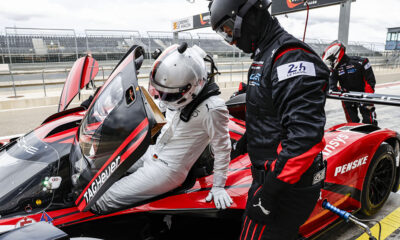Ligier Automotive and Bosch Engineering have jointly unveiled the Ligier JS2 RH2 hydrogen technology demonstrator car at Le Mans.
The 420 kW (563 hp) vehicle is based on the Ligier JS 2R racer but has undergone several modifications to accommodate a 3-liter V6 twin-turbocharged engine with direct hydrogen injection.
Ligier and Bosch aim to use the RH2 project to develop and demonstrate hydrogen technology, which is set to have a class at the 24 Hours of Le Mans in 2026.
The two-seater machine is not currently intended to enter any competitions, although Ligier Automotive president Jacques Nicolet indicated that the aim is to be “ready to race.”
Hydrogen is stored in three 700-bar onboard tanks supplied by Hexagon Purus that have a total capacity of 6.3 kg. The tube-frame chassis of the Ligier JS 2R has been replaced with a full-carbon monocoque, with the total weight of the car amounting to 1450 kg.
Brembo brakes from Ligier’s LMP3 car have been fitted, along with a Bosch anti-lock braking system and an eight-speed dual-clutch transmission.
“We have the bodywork, the design, of the JS 2R but inside it is a fully new car,” Nicolet told Sportscar365.
“The JS 2R is with a tubular chassis and we are [now] with a full carbon monocoque with the hydrogen tank fully integrated into it, for safety reasons and to have the maximum rigidity of the car.
“The goal is to be ready to race with this car. It was on the track two weeks ago at the Bosch test track. We did a debugging, but after this weekend we will start the [next] phase of the car’s development.”
While Ligier designed the monocoque, Bosch Engineering oversaw development of the vehicle’s engine, tank and safety systems.
The safety setup includes the separation of the tanks, the gas control components and the engine bay along with a “passive ventilation concept” of pipes that prevents gases from reaching the external air and from entering the cockpit.
The production-based origin of the Bosch-modified internal combustion engine has not been disclosed.
“With such a new technology, you need to overcome challenges,” said Dr. Johannes-Joerg Rueger, president of Bosch Engineering which oversees the company’s motorsport department.
“The first is the short timeframe for the development. Starting in November and being here in June with a car that has already been on a racetrack, is a fabulous achievement of the whole team.
“We took an existing V6 engine, converted that to H2 and did all the packaging, which was more on Ligier’s side. The tank control was an important part. The design was done, from the start, in order to be a vehicle that is safe and ready to race.”
GCK, Solution F Reveal Hydrogen GT Car
Le Mans has also seen the launch of the Foenix H2, a GT racing car developed by French company Green Corp Konnection and its subsidiary Solution F.
Like the Ligier JS RH2, the Foenix H2 is powered by a hydrogen-adapted internal combustion engine.
A direct injection system enables the hydrogen to fuel a supercharged 6.2-liter V8 unit, while “more than 8 kg” of hydrogen is stored in a single 700-bar tank from Forvia.
“I am delighted and proud to be presenting the Foenix H2 at the centenary of the 24 Hours of Le Mans, this legendary race which is now turning to hydrogen mobility,” said Eric Boudot, President of GCK.
“This car and its engine represent major advances in both motorsport and carbon-free mobility.”
Both the Ligier JS RH2 and the Foenix H2 are on display in a new Hydrogen Village at the 24 Hours of Le Mans where event organizer the ACO is aiming to raise awareness of hydrogen power.



























